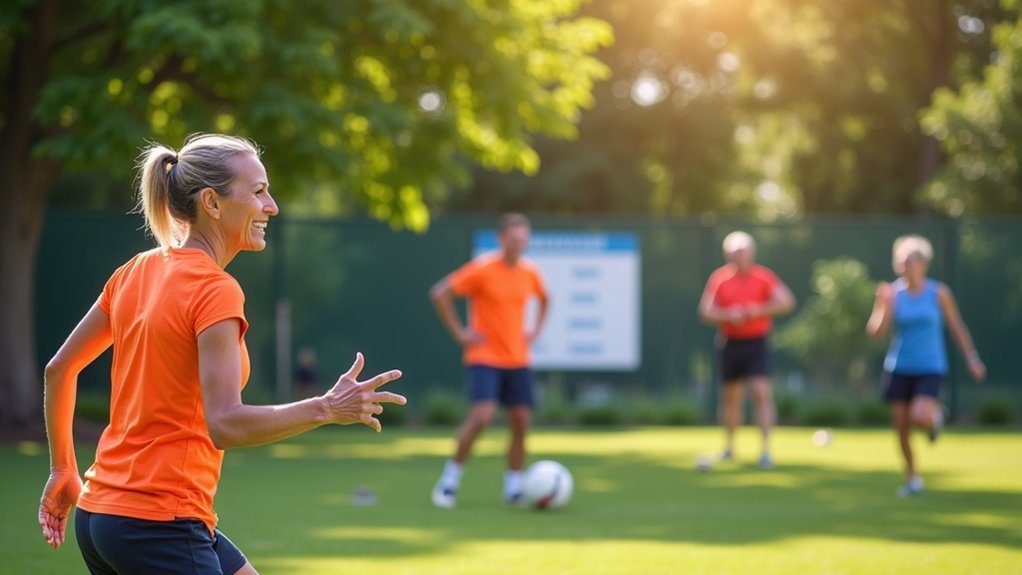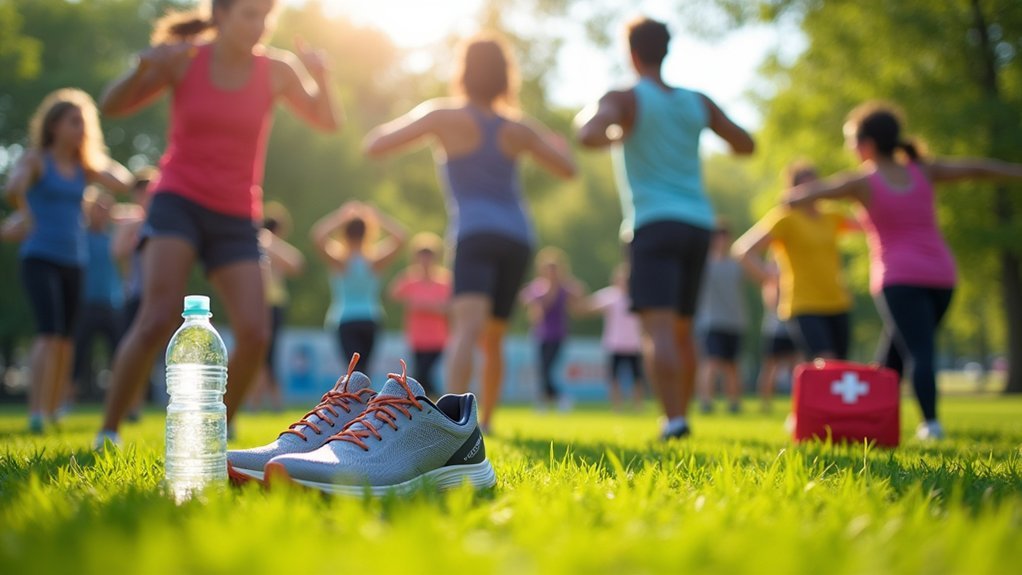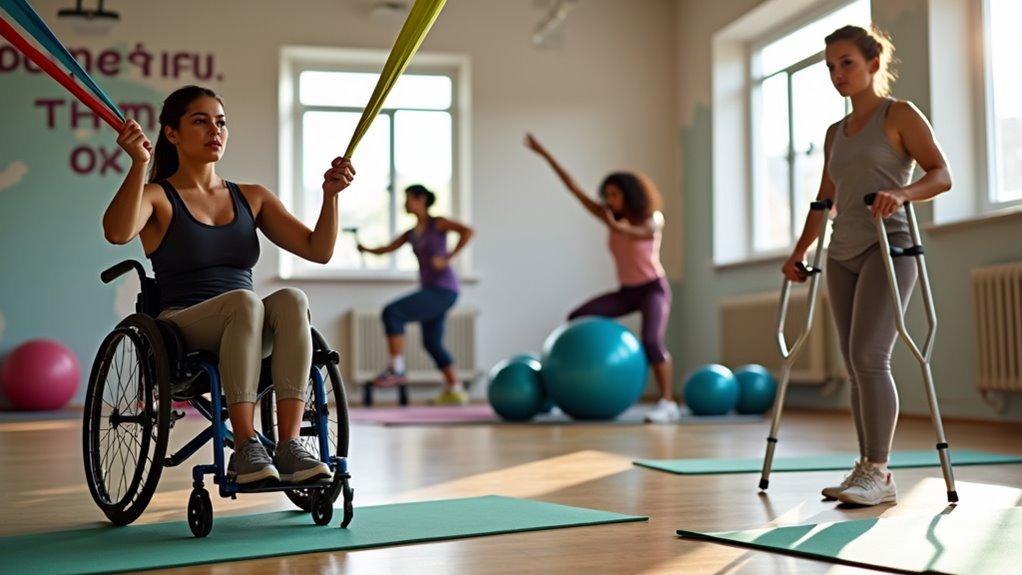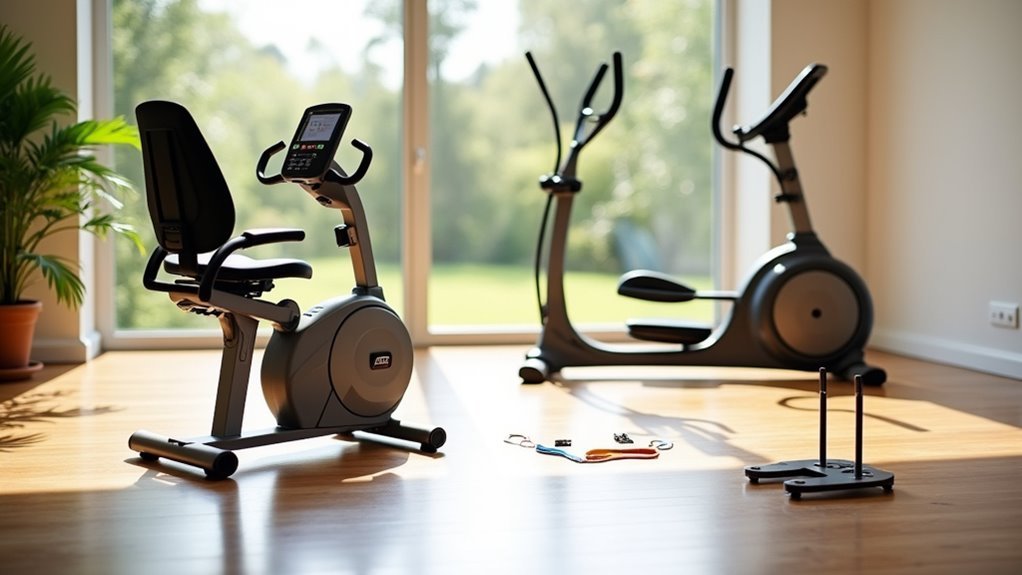To thrive in adult sports leagues, first choose a league that matches your fitness level and schedule availability—register early as summer spots fill quickly. Next, build team chemistry through social events and constructive feedback sessions that balance competition with connection. Finally, prevent injuries with proper warm-ups, sport-specific strength training, and consistent recovery practices. These foundational strategies will transform your recreational sports experience from merely participating to truly excelling.
Finding the Perfect League for Your Fitness Level and Schedule

How do you balance your desire for active sports participation with your busy adult life? Start by honestly reviewing your current fitness level. Recreational leagues offer beginner, intermediate, and competitive tiers to match your abilities.
Consider low-impact options like pickleball or swimming if you’re just starting out, or team sports like soccer and basketball for more advanced fitness levels. Many seniors find pickleball particularly engaging as it combines physical activity with valuable social interaction.
Next, evaluate your availability. Most adult leagues schedule games evenings and weekends, accommodating work commitments. Community centers and YMCAs provide varied time slots throughout the week.
Remember that summer leagues are especially popular post-pandemic, so register early to secure your preferred time.
The right league should fit both your physical capabilities and your calendar, making consistent participation possible and enjoyable.
Building Team Connection While Managing Competitive Dynamics
The balance between fostering camaraderie and managing competitive drive defines successful adult sports leagues. You’ll find deeper satisfaction when you invest time in building personal connections through appreciation circles and social gatherings outside game days.
Try implementing structured team exercises that challenge without overwhelming. Mix physical activities like relay races with strategic puzzles to develop well-rounded teamwork skills. Consider incorporating escape room activities as they effectively encourage teamwork and problem-solving in a fun, collaborative environment.
| Connection Strategy | Benefit | Implementation |
|---|---|---|
| Random grouping | Cross-level mentorship | Switch partners during drills |
| Shared meals | Informal bonding | Monthly team potlucks |
| Feedback sessions | Constructive growth | Post-game discussions |
Remember to model good sportsmanship yourself—it’s contagious. When conflicts arise, address them promptly through active listening and clear communication. By balancing healthy competition with genuine connection, you’ll create a team experience that transcends the scoreboard.
Preventing Injuries Through Proper Preparation and Recovery

Injury prevention stands at the core of any sustainable adult sports experience, requiring both strategic preparation and disciplined recovery.
Begin with thorough 15-20 minute warm-ups that include both cardio and sport-specific movements to prime your muscles and nervous system for action.
Don’t skip your cool-downs—light aerobic activity followed by stretching speeds recovery and reduces soreness.
Incorporate targeted exercises that strengthen muscles specific to your sport, focusing on dynamic movements that mimic game situations. Remember that injury prevention exercises can significantly reduce your risk of overuse injuries when practiced regularly.
Stay active during the off-season to maintain conditioning and avoid the shock of sudden activity.
Wear appropriate, well-fitted gear and never play through pain.
Consider consulting a physical therapist for personalized assessments that can identify movement issues before they become injuries.
Frequently Asked Questions
How Do Leagues Typically Handle Extreme Weather Conditions?
Leagues monitor extreme weather closely. They’ll cancel games for lightning within 10 miles, implement mandatory rest periods during heat, and assess field conditions. You’ll receive notifications through official channels if your game’s affected.
What Insurance Coverage Should Players Expect From Adult Leagues?
You should expect general liability and participant accident insurance from your league. If they’re well-organized, they’ll also offer liability for participants coverage and possibly umbrella policies for additional protection.
Are There Age Restrictions for Different Adult Sports Leagues?
Most adult leagues require you to be at least 18 years old to participate, though some sports like softball allow players as young as 16. Always check the specific age requirements during registration for your chosen league.
How Do Leagues Accommodate Players With Physical Disabilities?
Leagues accommodate you through adaptive equipment, modified rules, accessible facilities, and specialized programs like wheelchair basketball. You’ll find trained coaches, buddy systems, and personalized assessments to guarantee your meaningful participation regardless of physical limitations.
What Equipment Is Typically Provided Versus What Players Must Bring?
Leagues typically provide core equipment like balls, nets, and fields. You’ll need to bring your own protective gear, appropriate footwear, water bottle, and sometimes sport-specific items like personal bats or gloves.
In Summary
Remember, joining an adult sports league isn’t just about the game—it’s about finding joy in movement, building meaningful connections, and taking care of your body. Choose leagues that match your abilities, balance fun with competition, and prioritize your health through proper warm-ups and recovery. You’ll gain fitness, friendships, and fulfillment when you approach recreational sports with the right mindset and preparation.





Leave a Reply